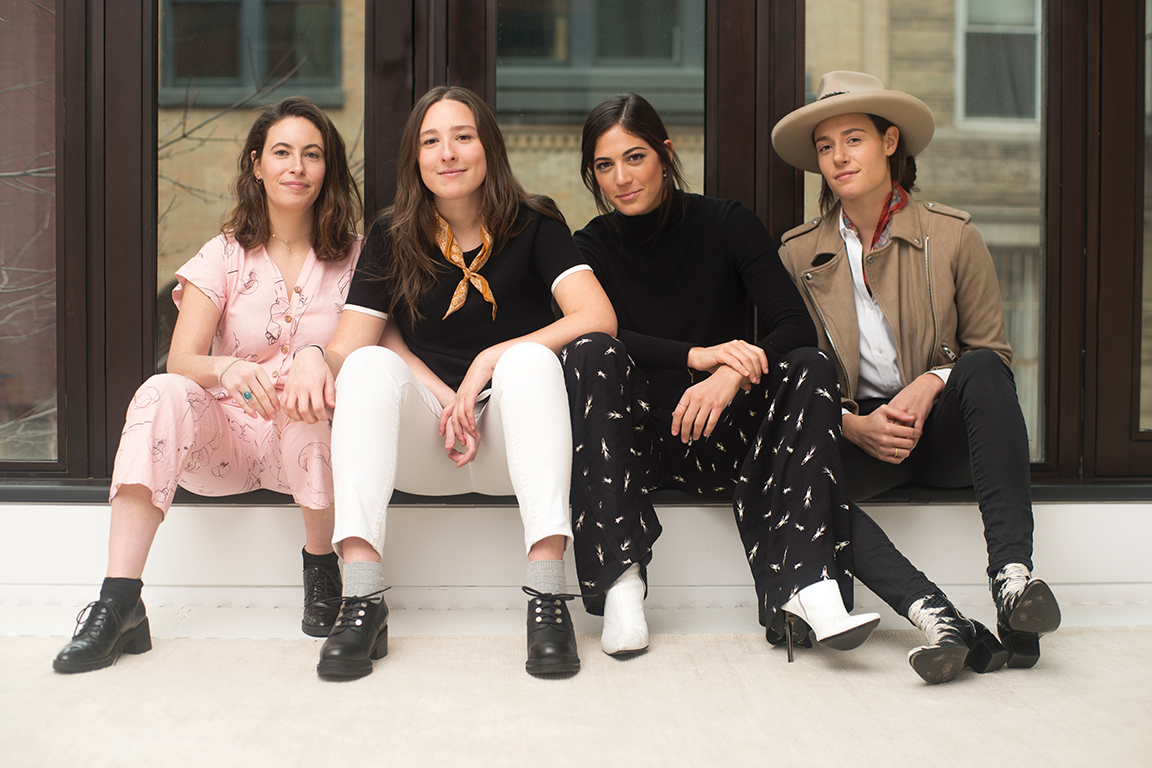
Last summer, the invite-only, all-girls party, Ellis, hosted a beach soiree so impossibly chic that it caught the eye of Vanity Fair. The $100 ticket included a party bus that shuttled city lesbians from the West Village to Dune Beach in the Hamptons and back, a beautifully catered dinner, an open bar stocked with top-shelf booze, and the enchanting experience of sipping on a glass of rosé as the sun set over the Atlantic Ocean. “The scene in East Hampton looked like a laid-back but upscale lesbian wedding,” Vanity Fair’s Hilary Weaver wrote about the event. “Clean, classy …[it was] a night out on the town without the stress of lines or worrying whether [an] ex will be inside.”
To say that Ellis is shaking up the New York lesbian nightlife scene would be the understatement of 2018. And it’s only March, dahling. Ellis isn’t merely razing (and raising!) the status quo for queer women’s events — it’s laying down fresh bricks.
Since its launch last April, Ellis has been “celebrating the beautifully curious, fluid, interesting and interested women of New York City,” according to its mission. From its kickoff at the Gordon Bar (inside SIXTY SoHo, one of downtown’s most exclusive boutique hotels), Ellis has evolved into one of the most talked-about parties to hit the scene this past year. Maybe it’s the notably attractive, stylish crowd that we’ve admired from our Instagram feeds; maybe it’s the sparkly, high-brow venues; maybe it’s the allure of the the parties’ exclusive (but never excluding) “by invitation only” (purr) guest lists; or maybe it’s because for most of us veteran NYC gay nightlife aficionados, the fabulous Ellis parties seemed to have sprug from (literally) nowhere.
Whatever the reasons, the lesbians have noticed, babe—and you should count yourself among the Ellis-enlightened, stat.
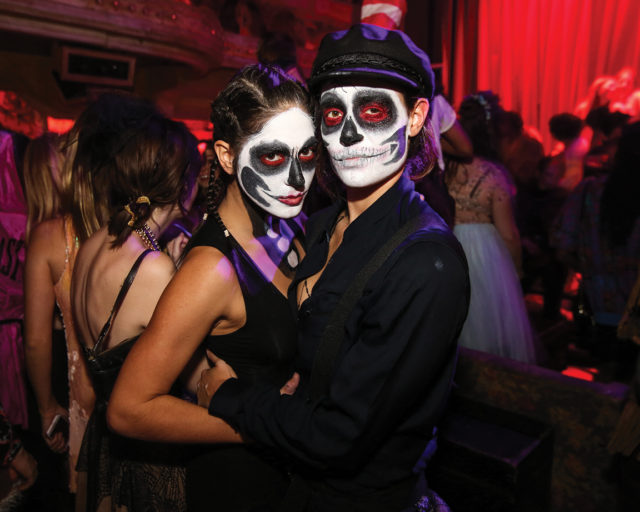
Case in point. “Ellis is the future of NYC lesbian nightlife. I’ve been around long enough to know it when I see it,” announced Grace Chu, a popular lesbian nightlife photographer, via her Facebook status after photographing the Ellis Halloween party at Manhattan’s notorious burlesque speakeasy, The Box. Guest of a Guest, a digital publication that covers the nation’s most exclusive events and shiniest people, was compelled to pen a profile on Ellis after its packed-to-the-gills Pride party at the Chelsea club Up & Down. “By using attractive New York venues and encouraging openness and exploration, Ellis has tapped into a cultural moment to offer something for groups long overlooked,” wrote one of the site’s editors.
One might assume that an “invite-only” event in bougie Southampton or at the ultra-trendy SIXTY SoHo might come served with a side of snobbery, but hand-to-heart, I fiercely swear that my experiences with Ellis have proven the exact opposite. The women behind Ellis are somehow able to disarm their event attendees in a way that makes cliquishness or elitism all but dissipate into thin air. They’ve created events that make it OK for social groups to cross party lines and hang out with women they might not otherwise encounter inside the glittery gay nightclub bubble.
In a culture that’s seemingly devolving into amplified divisiveness and a world that’s becoming alarmingly disconnected and antisocial, just how, exactly, did the Ellis crew foster an environment in which women continually forge countless authentic connections, and so many different walks of life happily engage? It all comes down to four New York women who’ve clearly tapped into a force — this irresistable, veritable cocktail of class and comraderie, shaken and stirred — over which our community is understandably obsessing.

I first met the women behind Ellis on the beach in Southampton after stepping off one of the two party buses that chauffeured what felt like dozens upon dozens of lesbians from the city to the East End. I had been wildly nervous about taking the party bus all the way to the Hamptons, as I suffer from bouts of acute social anxiety. The idea of not being able to escape was enough to make my fluttering heart soar out of my chest and splatter against the pavement of Interstate 495. Much to my surprise, the bus ride proved nothing short of a friendly blast that felt more like a giddy adolescent ride to an all-girls camp than to a members-only party.
First, I met Kelsey Hunter. Clad in an effortlessly cool fedora and draped in distressed denim, Hunter expressed a magnetic, open-hearted energy from the jump. She radiated the rare kind of warmth that instantly puts a tightly wound soul at ease. Hunter quickly introduced me to the rest of the Ellis crew: the charismatic Sage Fuchs (Hunter’s girlfriend), the super-hospitable Blaire Preiss, and the delightfully spirited Jane Goldstein (Preiss and Goldstein are also a couple). I watched in awe as they tended to every single woman at their beautiful beach party, ensuring each hand held a full drink and each guest felt not only comfortable, but fabulously part of the fun. I have never, to date, attended a party of that size with such a grand display of hospitality from the event hosts. An hour into the festivities, it was clear: The Ellis girls were cultivating a community and a very specific kind of intimacy by directly inserting themselves into the overall ambiance and energy of the party.
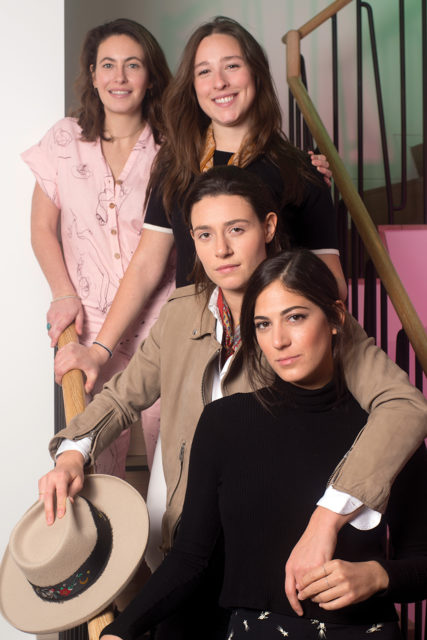
So how do they do it? I point-blank ask them this question over coffee in the West Village, a week before the Ellis Halloween party.
According to Preiss, chic venues comprise a huge piece of the Ellis puzzle. “Being in a beautiful space enhances the experience of how you feel when you walk in there. You feel empowered when you step inside because this is a space that you deserve. This is a space that’s for you,” she says with palpable passion.
Hunter agrees. “It also changes the attitude, I think. If you walk into a nicer place or a more upscale place, everyone just seems more friendly. It’s classier. You hold yourself in a different way. I think that’s really important. We aren’t just a hookup culture; we want to make lasting relationships and connections.”
And while they both recognize that Ellis’ aesthetically pleasing, highfalutin’ venues empower their guests — who all too often are only able to find safe spaces within the confines of a loud bar — the crew in no way disparages NYC LGBTQ nightlife that differs in decor and vibe. They’re quick to affirm their love and respect for the city’s classic, longstanding gay and lesbian bars.
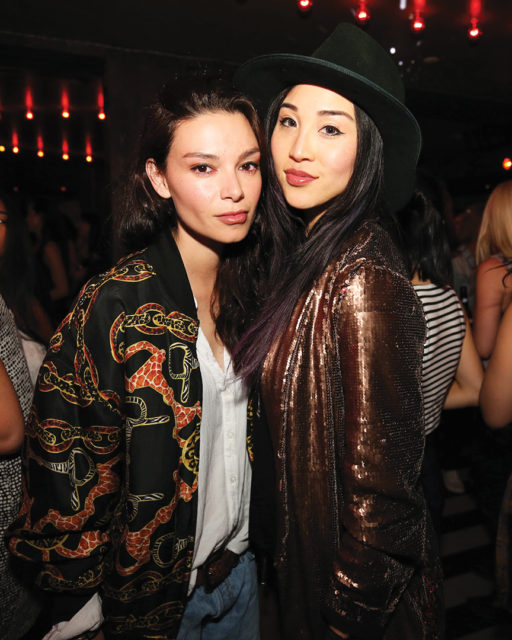
“We need spaces like Cubbyhole. We need spaces like Stonewall. We need places like Henrietta Hudson. These places are landmark spaces that will always be necessary, and they are beautiful places to be. Women deserve Cubbyhole but also deserve spaces like the ones we choose for Ellis. They deserve to choose where they would like to be on whatever given night.”
The notion that one night we can take shots with our girls at Henrietta’s and the next night we can slowly sip a glass of champagne with our girls at the Rose Bar can be thrilling to a demographic that has traditionally been limited in atmosphere and choice of venues.
Goldstein also suggests that the “by invitation” aspect of Ellis events makes them the perfect place to meet new people. “You walk into this space because it’s a beautiful bar or venue, you know that you’re there because you’re invited, and there’s this element of feeling special in some way. It’s a starter of conversation! Women tell us they will ask another guest, ‘How did you hear about Ellis, how did you find out about Ellis, who do you know that’s been to Ellis?’ If Ellis is an actual conversation starter, that’s all we want,” Goldstein says.
“I also think when you’ve been invited to the space… there is no ‘this is my spot, this my turf’ attitude. No one is territorial of the space, because everyone belongs there. I think that’s what makes the space feel so special,” says Fuchs, who by day produces creative content for a major NYC hotel and by night oversees venues that Ellis books.
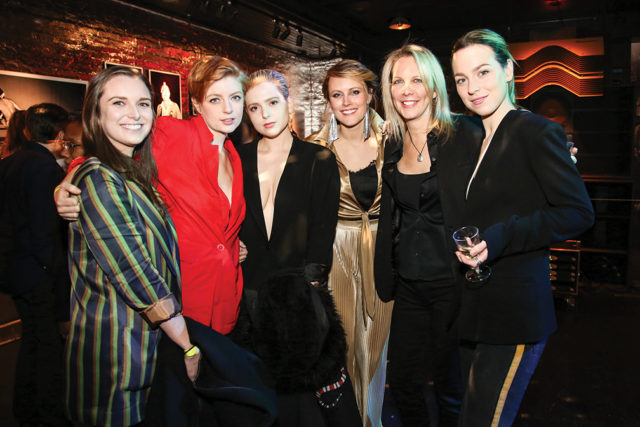
“Sage gets the venues. There is no one I know that can deal with the personality of a venue manager the way Sage can. It’s not anything I could ever do. So it’s a complete asset,” says Preiss, who has been friends with Fuchs since early childhood.
Preiss’ effusive praise of Fuchs is just par for the course in this group. One of the things that’s so striking about the Ellis founders is the sweet way in which they interact. There isn’t a trace of competitive energy between the women, and they’re constantly extolling each other’s talents and virtues.
Probably, at least in part, their success hinges on the fact that each of these women brings a vastly different, yet equally important, skill set to the table. “Jane is the realist,” they say, “and Sage is the dreamer, and the two balance each other out.”
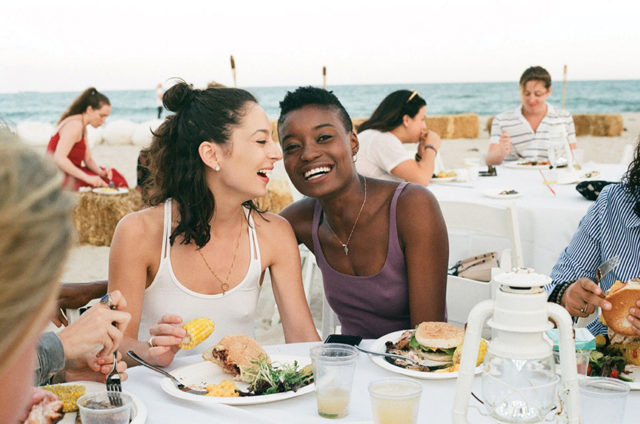
Goldstein, who works in marketing, is the point-person for Ellis’ collaborations and operations. Not surprisingly, she comes across as impressively business-savvy and bright.
“Jane is really good with numbers,” Fuchs tells me.
“She’s really good at keeping us grounded,” Preiss adds.
Hunter, on the other-hand, serves as the resident artist of the group. She’s a talented singer-songwriter who plays prestigious venues in the city, so naturally, she works with the music, DJs and talent. She also deeply values connecting with the event attendees.
“I always zoom into a person at one event. And I want to dig into that person and understand them, and therefore create long-lasting relationships from these events. So I guess I’m sort of like a recruiter,” Hunter laughs.
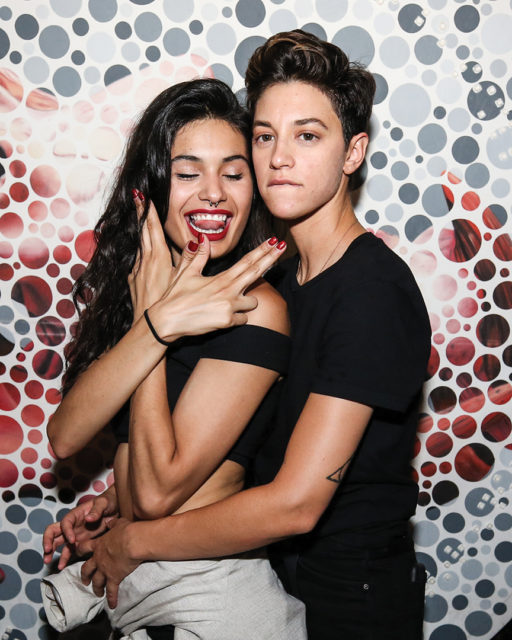
By day, Preiss is the point-person and assistant for a talent manager who oversees the careers of high-profile actors. She runs Ellis’ much-loved and ever-growing Instagram account, handles the coveted email list and manages the event invites.
I ask them how they strike the delicate balance of keeping their events exclusive and curated while also maintaining a healthy amount of publicity and excitement surrounding each party. The team doesn’t seem to be overthinking their strategy. “It’s happened extremely organically,” Preiss says.
“If someone has been to one of our events and enjoyed it, and wants to recommend it to their friends, we want those friends to be there. And every extension of their friends. We keep it invite-only to make it feel more communal, as opposed to a less personal ‘public’ event. We want to maintain a community, but it’s not exclusive,” says Preiss. In other words: Ellis isn’t trying to be a difficult-to-get-into private club, like the SoHo House or Norwood House or the Wing, even. The strategy aims for intimacy, not elitism.
Goldstein puts it perfectly: “Look, lesbians know lesbians. So the curating happens organically […] If you’re a woman and you want to be at our events, you should be at our events.”
Longtime NYC nightlife veteran, community leader and co-owner of The Stonewall Inn, Stacy Lentz, believes wholeheartedly in the purity of the Ellis mission. “As we have seen in recent current events, we really need the younger generation to lead us into a better future. It’s truly awesome to see a group of young women putting together amazing experiences for other queer women,” Lentz tells GO. “The crowd is mixed, and they are hosting events outside the norm that we usually don’t see offered up to women in our community. It’s impressive and inspiring to see them want to offer connection, networking and a sense of kinship that I often fear is missing for younger LGBTQ people.”

Bolstering the Ellis promise of community and connection, swathes of self-proclaimed “shy women” continually express how comfortable they feel at Ellis’ events. Hunter explains that many young women who are just coming out, or maybe experimenting, find themselves drawn to Ellis due to its communal, intimate feeling: Ellis manages to somehow meld an invite-only premise, which, to the un-Ellis-initiated, may come across as exclusive, with a welcoming vibe that remains totally inclusive. “You want a support system,” Hunter says. “Being in a community feels supportive. It makes you feel comfortable. It’s different than going to a bar where it’s rowdy and you can’t hear anybody. Ellis is more of a social environment where you can actually meet someone! And you have the four of us, and I think we make people feel really comfortable. We’re very personable.”
It’s clear that Ellis is, as Fuchs dutifully expresses, “not just a job” to its founders. Their desire to nurture an environment that encourages real and organic connections with other women stems from their own hunger for community.
“When we started Ellis, we were like, ‘We’re in the city and we’re just out of school, and we only know the four of us. And like, we want to meet us, but not us.’ We wanted to find a crew of girls that we didn’t have in school, so we selfishly made Ellis so we can make friends,” Preiss says, laughing.
“We just want to hang with girls!” Fuchs exclaims. The group laughs in agreement.
The Ellis team’s invite list budded from only 30 email addresses to 200 email addresses within a week, which then bloomed to well over 2,000 email addresses in less than a year. This exponential growth gives the foursome high hopes for the future of their brand.

“I would love a huge loft in the city where girls could just come and hang when they want to,” Fuchs says.
“Let’s make it a place where you can go out at night and wake up and come and bring your computer and get coffee in the morning and do work. And in the afternoon, make it a boozy brunch spot, and on the weekend, make it an art gallery of sorts. Just for girls,” Preiss chimes in.
“If we could literally have a SoHo House for lesbians…” Goldstein says dreamily.
“That would be fantastic!” I can’t help but shout.
“A hotel,” Preiss continues.
“That’s my goal in life, a lesbian hotel. A boutique hotel for lesbians in the West Village,” Fuchs firmly declares with intention, as if she’s consciously putting her dream into the universe. Hunter smiles in agreement. While the opportunities for Ellis’ expansion seem limitless, it’s clear that this special group of women have filled a gaping void, not just in the world of NYC nightlife, but in the lesbian community at large. We long to connect. In an intimate setting. Where we can hear and see each other, not just through the static-y screen of a computer or in the impersonal darkness of a club.
Maybe Ellis feels so different because of the lack of ego in the women running it.
As Fuchs says, “It’s not about us four, it’s about the other girls in the community. We don’t want it to be just a party, we want it to be long-lasting relationships.” Ellis is many things. But “just a party” is most definitely not one of them.

What Do You Think?